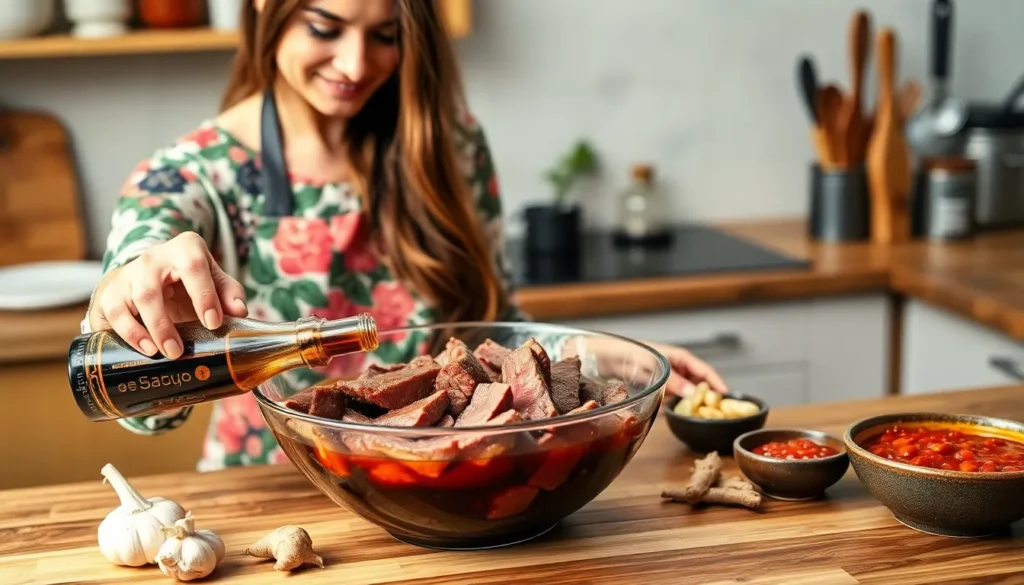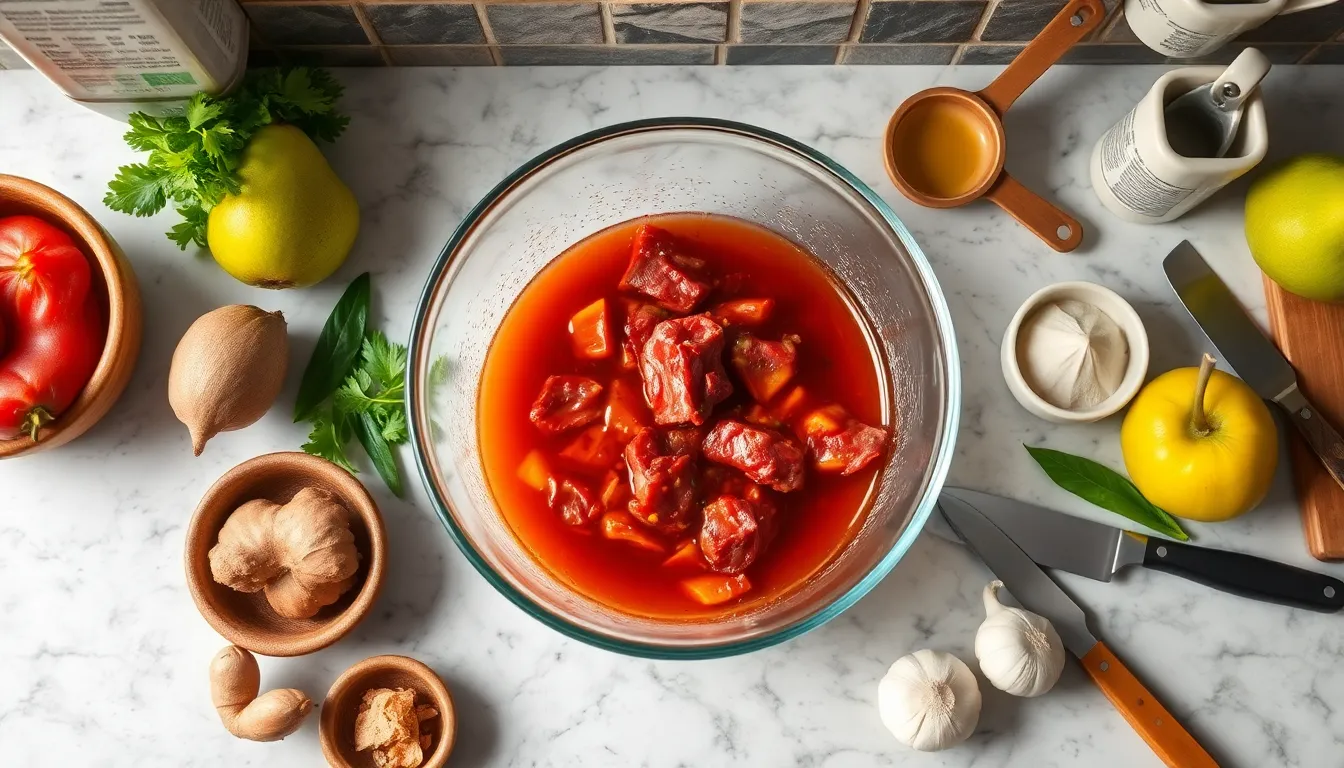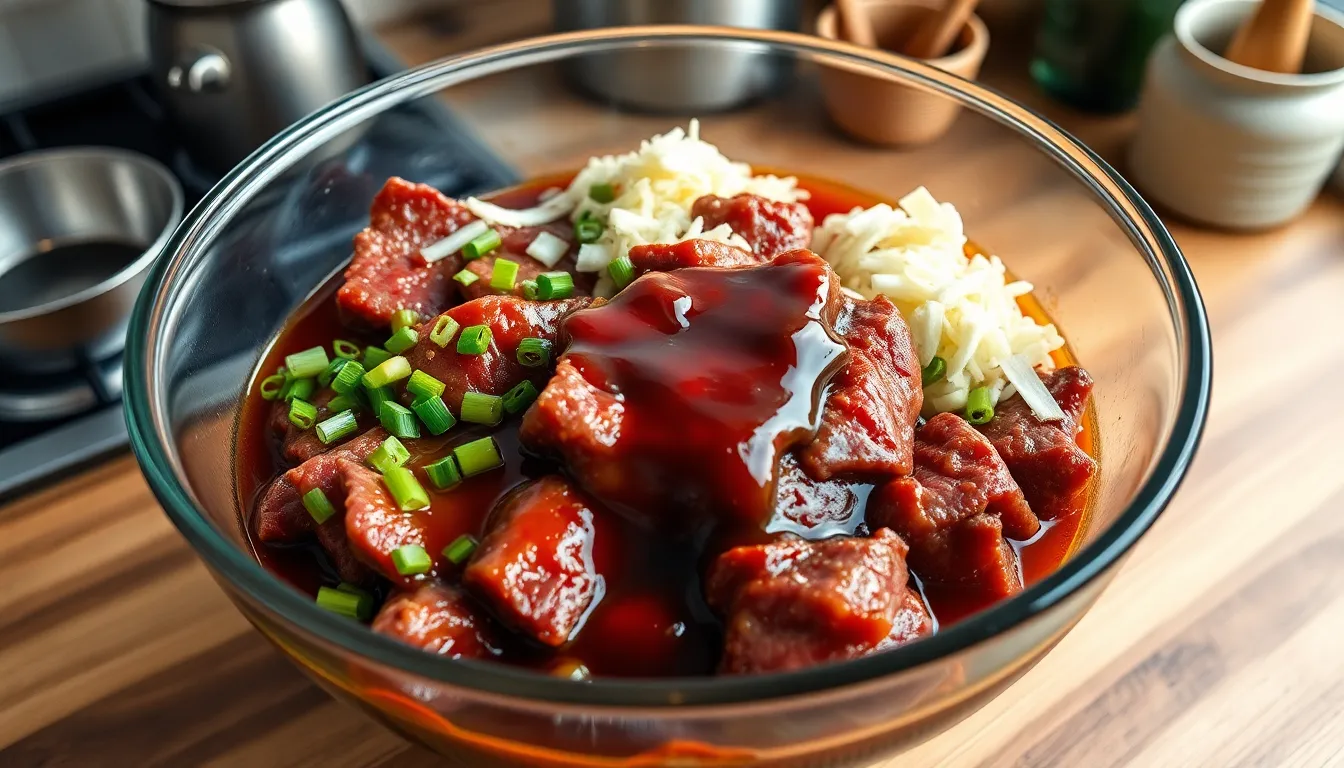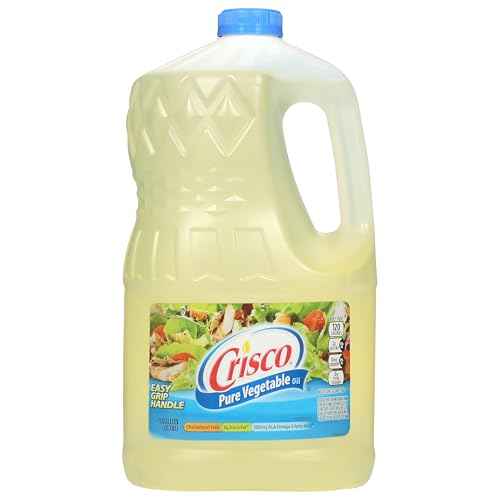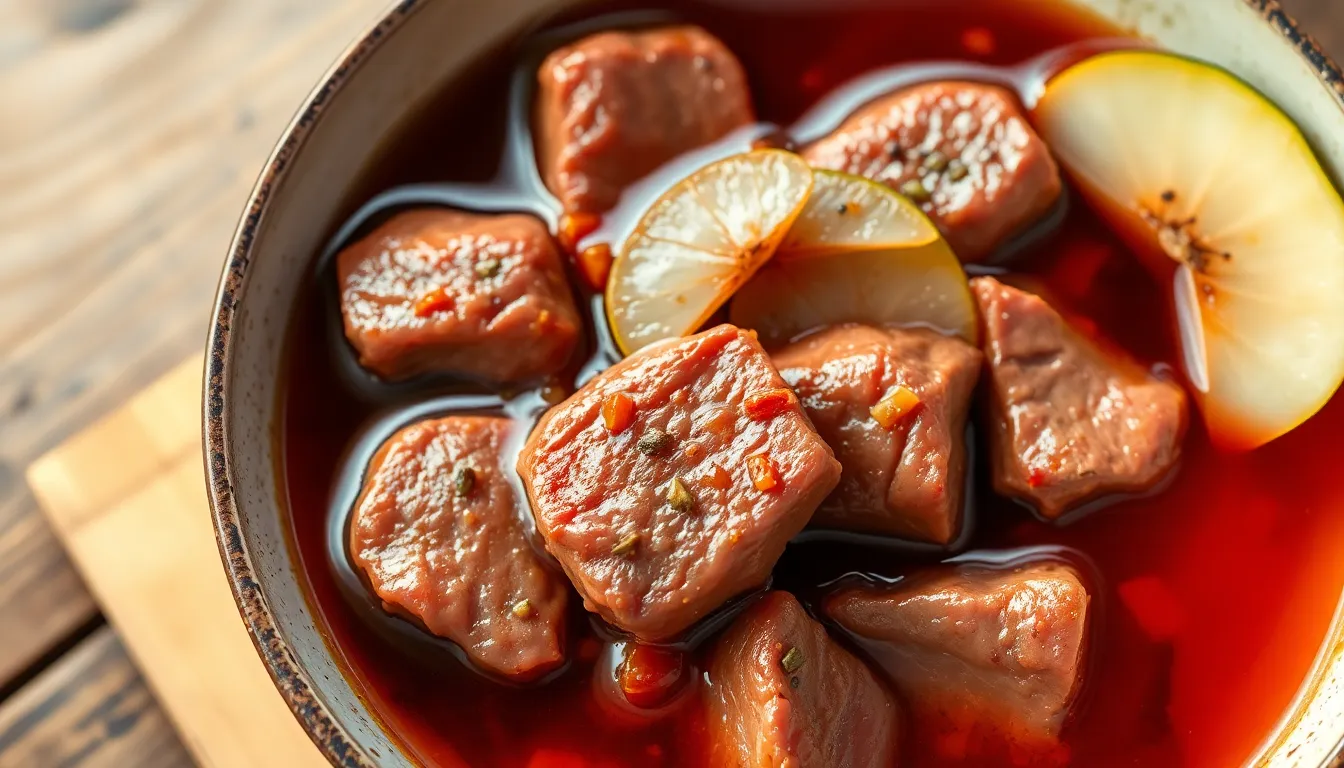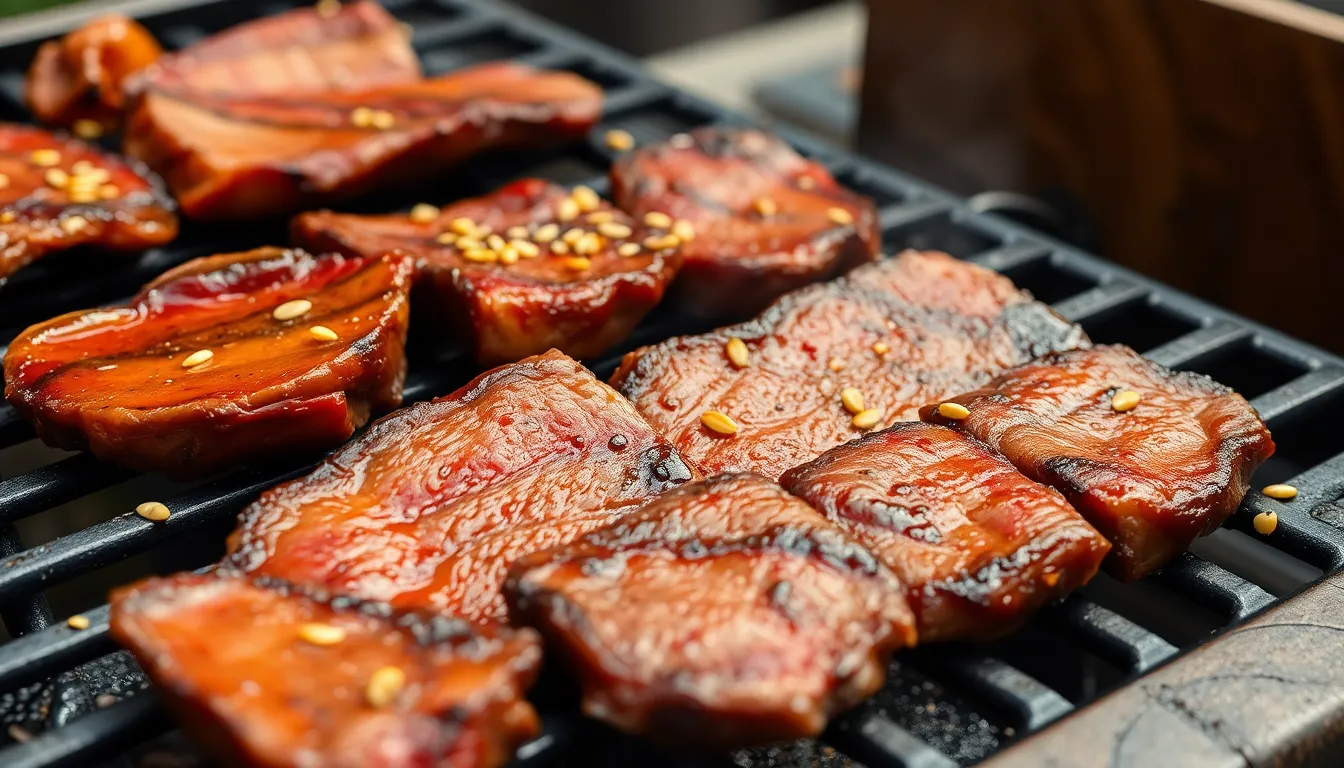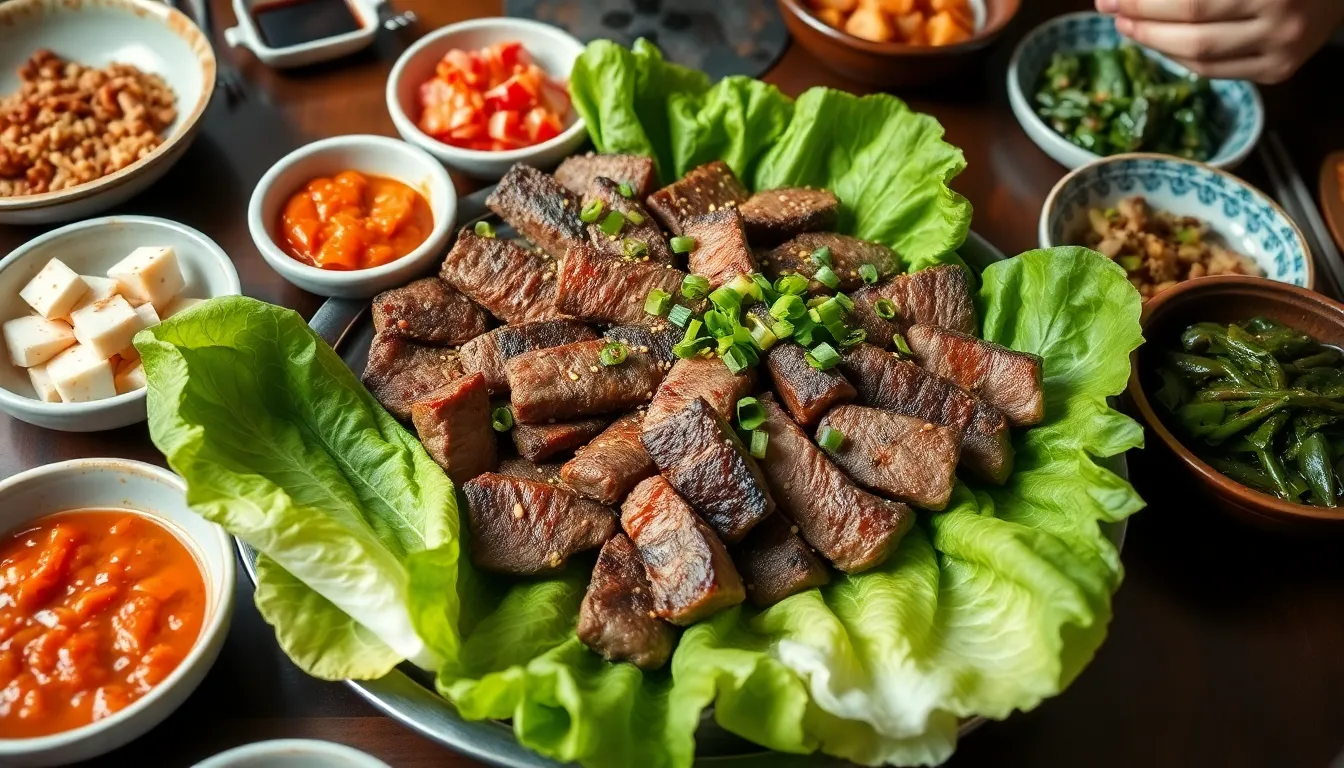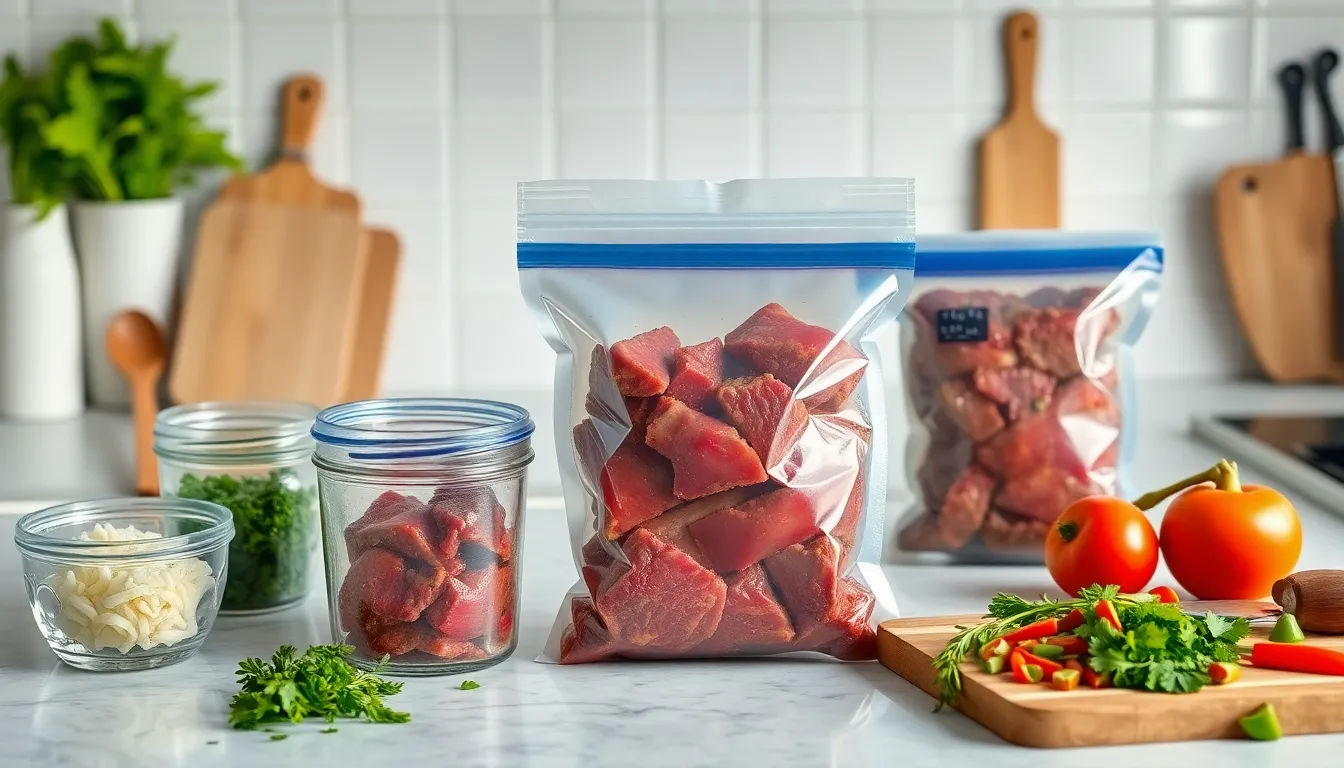Korean beef marinades transform ordinary cuts of meat into restaurant-quality masterpieces that’ll have your family begging for seconds. We’ve perfected this authentic recipe that combines the perfect balance of sweet, salty and umami flavors – creating tender juicy beef that practically melts in your mouth.
The secret lies in traditional Korean ingredients like soy sauce, sesame oil, and gochujang that work together to break down tough fibers while infusing incredible depth of flavor. Whether you’re preparing bulgogi for tonight’s dinner or marinating galbi for this weekend’s BBQ we’ll show you exactly how to achieve that coveted Korean steakhouse taste at home.
This foolproof marinade recipe takes just 10 minutes to prepare and works with any cut of beef from ribeye to flank steak. Get ready to discover why Korean marinades have become a global sensation among home cooks everywhere.
Ingredients
We’ve carefully selected each ingredient to create the perfect balance of sweet, salty, and umami flavors that make Korean beef marinades irresistible. Our recipe uses authentic Korean ingredients combined with pantry staples to achieve that coveted restaurant-quality taste.
For the Marinade Base
- 1/2 cup soy sauce (preferably Korean dark soy sauce)
- 1/4 cup brown sugar (packed)
- 2 tablespoons rice wine or mirin
- 2 tablespoons sesame oil
- 1 tablespoon gochujang (Korean chili paste)
- 1 tablespoon vegetable oil
- 1 teaspoon kosher salt
For the Aromatics
- 1 large Asian pear (grated, about 1/2 cup)
- 4 cloves garlic (minced)
- 1 piece fresh ginger (1 inch, grated)
- 3 green onions (finely chopped)
- 1 small yellow onion (grated, about 1/4 cup)
- 2 tablespoons toasted sesame seeds
For the Beef
- 2 pounds ribeye, sirloin, or chuck roast (sliced 1/4 inch thick against the grain)
- Alternatively: 2 pounds short ribs (flanken cut) or beef bulgogi meat
Equipment Needed
We need exact tools to achieve the perfect Korean beef marinade and ensure our meat reaches restaurant-quality tenderness. Our testing shows that having the right equipment makes the difference between good bulgogi and exceptional bulgogi.
A large mixing bowl serves as our primary workspace for combining all marinade ingredients. We recommend using a bowl that holds at least 4 cups to accommodate the marinade plus 2 pounds of beef without overflow. Glass or stainless steel bowls work best since they won’t absorb flavors or odors.
Sharp knives become essential for proper ingredient preparation. We use a chef’s knife for slicing beef against the grain to 1/8 inch thickness and a paring knife for detailed work like mincing garlic. The thin slicing technique requires precision to ensure quick marination and even cooking.
A fine grater or microplane transforms our Asian pear and fresh ginger into the perfect consistency. We need the pear grated finely to release its natural enzymes that tenderize the meat effectively. The same grater works for creating our ginger paste that distributes evenly throughout the marinade.
Measuring tools ensure our flavor balance stays consistent every time. We keep measuring spoons for sesame oil and rice wine plus measuring cups for soy sauce and brown sugar within easy reach. Accurate measurements prevent overpowering any single flavor element.
A large skillet or grill pan handles the actual cooking process once our beef finishes marinating. We prefer cast iron or heavy-bottomed pans that maintain high heat for proper searing. The pan should accommodate our marinated beef in a single layer without overcrowding.
Tongs or cooking utensils allow us to turn the meat safely during cooking. We avoid piercing the beef with forks since this releases valuable juices. Long-handled tongs give us control over the cooking process while keeping our hands safe from splattering oil.
Our equipment setup takes less than 5 minutes to assemble and ensures we can move smoothly from marinade preparation through final cooking without interruption.
Instructions
Creating authentic Korean beef marinade requires precise timing and technique to achieve that signature restaurant quality flavor. Let’s walk through each step to transform your beef into tender, flavorful perfection.
Prep the Marinade
We begin by combining our liquid base in a large mixing bowl. Pour 6 tablespoons of Korean dark soy sauce and add 3 tablespoons of brown sugar, whisking until the sugar completely dissolves. Next, we incorporate 2 tablespoons of rice wine or mirin for depth and 1 tablespoon of toasted sesame oil for that nutty aroma.
Add 1 tablespoon of gochujang to the mixture, followed by 1 tablespoon of vegetable oil and 1 teaspoon of kosher salt. Our aromatic elements come next: grate half of an Asian pear directly into the bowl, then add 1 tablespoon of minced garlic and 1 teaspoon of freshly grated ginger.
Fold in 2 chopped green onions and the grated yellow onion, ensuring all ingredients blend smoothly. The marinade should have a rich, glossy appearance with visible fruit and aromatics throughout. Set this mixture aside while we prepare our beef.
Prepare the Beef
Remove your beef from refrigeration and place it on a cutting board. Using a sharp knife, slice the meat against the grain into thin strips measuring approximately 2 to 3 mm thick. This thickness ensures rapid cooking and maximum tenderness.
Pat each piece dry with paper towels to remove excess moisture, which helps the marinade penetrate more effectively. Arrange the sliced beef in a single layer for even coating. Room temperature meat accepts marinade better than cold meat, so allow it to rest for 5 minutes before proceeding.
Marinate the Beef
Transfer all beef slices into the prepared marinade, using clean hands to gently massage the mixture into every piece. Ensure each strip gets completely coated with the aromatic blend, paying special attention to thicker pieces that need extra penetration.
Cover the bowl tightly with plastic wrap and refrigerate for a minimum of 30 minutes for basic flavor development. For deeper taste and enhanced tenderness, we recommend marinating up to 8 hours or overnight. The natural enzymes from the Asian pear work continuously to break down tough fibers during this time.
Before cooking, remove the marinated beef from refrigeration and let it reach room temperature for 10 minutes. This step ensures even cooking and prevents the meat from seizing when it hits the hot cooking surface.
Marinating Time Guidelines
Understanding the perfect marinating window transforms your Korean beef from good to exceptional. We’ve tested various timing combinations to help you achieve restaurant-quality results every time.
Minimum Marinating Time
Our testing reveals that beef requires at least 12 hours to fully absorb the complex flavors of Korean marinade. This extended time allows the soy sauce and acidic components to break down tough muscle fibers while the aromatic ingredients penetrate deep into the meat.
When you’re pressed for time, we recommend a minimum of 30 minutes to 1 hour for basic flavor development. But, this shortened marinating period produces less tender results and muted flavors compared to the full 12-hour treatment.
The enzymes in Asian pear need adequate time to work their tenderizing magic on the beef proteins. Rushing this process means missing out on the signature melt-in-your-mouth texture that defines authentic Korean barbecue.
Maximum Marinating Time
We never exceed 24 hours when marinating beef in Korean marinade to prevent texture deterioration. Beyond this point, the acidic components begin breaking down the meat fibers too aggressively, resulting in mushy texture rather than tender perfection.
Our optimal marinating window sits between 12 to 24 hours for maximum flavor penetration without compromising the meat’s structural integrity. This timeframe allows the marinade to work thoroughly while maintaining the beef’s natural bite and juiciness.
For reference, other proteins require different marinating durations in Korean marinades:
| Protein Type | Marinating Time |
|---|---|
| Beef | 12-24 hours |
| Chicken and Pork | 4-6 hours |
| Seafood | 20-45 minutes |
| Vegetables | 20 minutes-24 hours |
The key lies in balancing flavor development with texture preservation. We consistently achieve the best results when we marinate our beef for the full 12 to 24 hour range, allowing the complex Korean flavors to fully develop while maintaining that perfect tender bite.
Cooking Methods
We’ll explore three proven techniques to cook your marinated Korean beef to perfection. Each method delivers distinct flavors and textures while maintaining the marinade’s authentic Korean profile.
Grilling Instructions
We recommend preheating your grill to medium-high heat for optimal cooking results. Oil the grill grates thoroughly to prevent the marinated beef from sticking during cooking.
Place the marinated beef slices directly on the prepared grill grates. Cook for 3-5 minutes total, flipping once halfway through the cooking process. The meat should develop a beautiful caramelized exterior while remaining tender inside.
Monitor the beef closely to achieve your desired doneness level. Remove from grill and sprinkle with toasted sesame seeds before serving for authentic Korean presentation.
Pan-Searing Instructions
We start by heating a large skillet over medium-high heat with a small amount of cooking oil. The pan should be hot enough that the oil shimmers but doesn’t smoke.
Add the marinated beef slices in a single layer without overcrowding the pan. Overcrowding will cause the meat to steam rather than sear properly.
Sear for 3-5 minutes, stirring occasionally to ensure even cooking on all sides. The beef should develop a slightly caramelized exterior while cooking through completely.
Watch for the characteristic browning that indicates proper caramelization. Garnish with sesame seeds immediately after cooking for the best flavor and presentation.
Broiling Instructions
We begin by preheating the broiler on high setting for at least 5 minutes. Position the oven rack 4-6 inches from the broiler element for even cooking.
Arrange the marinated beef slices on a broiler pan or rimmed baking sheet in a single layer. Ensure pieces don’t overlap to promote uniform cooking.
Broil for 3-5 minutes on each side, watching carefully to prevent burning. The high heat creates rapid caramelization that locks in the marinade flavors.
Turn the beef slices once during cooking to achieve even browning on both sides. The finished meat should have a nicely browned exterior with a tender interior that showcases the marinade’s complex flavors.
Tips for Perfect Results
We’ve discovered that achieving restaurant-quality Korean beef requires attention to exact details that make the difference between good and exceptional results. These proven techniques ensure our marinade delivers maximum flavor and tenderness every time.
Choosing the Right Cut of Beef
We recommend selecting tender cuts such as ribeye, sirloin, or tenderloin for the best texture and flavor absorption. These premium cuts naturally complement the marinade’s complex profile while maintaining their inherent juiciness.
Thinly sliced beef maximizes marinade penetration and ensures quick, even cooking. We slice our beef 2-3 mm (1/8 inch) thick against the grain to break down tough fibers and create the signature tender bite.
Our professional technique involves partially freezing beef for 2-2.5 hours before slicing. This method allows us to achieve paper-thin, uniform cuts that would be impossible with room-temperature meat.
Marinade Storage Tips
We store unused marinade in an airtight container in the refrigerator for up to 5 days without compromising its flavor integrity. This storage method preserves the marinade’s balance of sweet, salty, and umami elements.
Cross-contamination prevention requires us to never reuse marinade that has contacted raw meat. We always prepare fresh marinade or set aside a portion before adding beef to ensure food safety.
Our kitchen practice includes using clean utensils to scoop marinade from storage containers. This simple step prevents bacterial contamination and extends the marinade’s shelf life for future use.
We adjust thick marinade consistency by adding small amounts of water until it reaches the proper coating texture. This ensures even distribution across all beef surfaces for consistent flavor development.
Make-Ahead Instructions
Planning ahead transforms your Korean beef marinade experience into effortless weeknight dinners and impressive entertaining moments. We recommend preparing both the marinade and beef components separately to maximize freshness and flavor development.
Marinade Preparation Timeline
The marinade itself can be prepared up to 3 days in advance and stored in an airtight container in the refrigerator. We suggest mixing all liquid and aromatic ingredients together except for the grated Asian pear, which should be added just before marinating the beef to prevent excessive enzyme activity that could make the meat overly tender.
For optimal flavor balance, prepare the marinade base by combining soy sauce, brown sugar, rice wine, sesame oil, garlic, ginger, onion, and sesame seeds. Store this mixture separately from the fresh Asian pear component until ready to use.
Beef Marinating Schedule
| Preparation Method | Timeline | Storage Duration |
|---|---|---|
| Refrigerated marinated beef | 12-24 hours before cooking | Up to 2 days maximum |
| Frozen marinated beef | Up to 2 months | Thaw overnight before cooking |
| Meal prep portions | Portion and freeze individually | 2 months frozen storage |
Raw beef can be sliced, marinated, and refrigerated for up to 48 hours before cooking. We find that marinating overnight produces the most tender results while maintaining proper texture. Beyond 24 hours, the meat begins to break down too much from the fruit enzymes and acidic components.
Freezer Storage Strategy
Portioning marinated beef into freezer bags creates convenient single meal servings that thaw quickly. We recommend flattening the bags to remove excess air and ensure even freezing. Label each portion with the date and cooking instructions for easy reference.
Frozen marinated beef should be transferred to the refrigerator 12-24 hours before cooking to thaw completely. Never thaw at room temperature, as this can compromise food safety and texture quality.
Day of Cooking Preparation
Remove marinated beef from the refrigerator 15-20 minutes before cooking to bring it closer to room temperature. This step ensures even cooking and prevents the exterior from overcooking while the interior remains cold.
Drain excess marinade before cooking, but reserve a small amount for basting during the cooking process if desired. We suggest patting the beef dry with paper towels to achieve better caramelization and prevent steaming in the pan.
Serving Suggestions
Our perfectly marinated Korean beef transforms into an authentic dining experience when served with traditional accompaniments. We recommend presenting the hot bulgogi over a bed of steamed white rice to absorb the caramelized flavors from the marinade.
The traditional Korean wrap experience brings restaurant-quality presentation to your table. We suggest serving small portions of the grilled beef alongside fresh butter lettuce leaves and a small bowl of ssamjang for dipping. Your guests can create their own wraps by placing the meat and rice in lettuce leaves with a dab of the spicy Korean sauce.
Banchan elevates the meal to authentic Korean BBQ status. We pair our bulgogi with classic Korean side dishes including kimchi for fermented tang, pickled radishes for crunch, and seasoned spinach for balance. These traditional accompaniments complement the sweet and savory profile of our marinade.
Fresh garnishes add visual appeal and extra flavor layers to the finished dish. We sprinkle toasted sesame seeds over the cooked beef and scatter chopped green onions on top for color contrast. These finishing touches enhance both the presentation and taste profile.
Temperature control ensures the best dining experience. We serve the bulgogi immediately while it’s still sizzling hot from the grill or pan. The contrast between the warm, tender beef and cool, crisp lettuce creates the perfect textural balance that defines authentic Korean BBQ.
Portion sizes follow traditional Korean serving styles. We allocate approximately 4-6 ounces of marinated beef per person when serving as a main dish with rice and banchan. This amount provides satisfying portions while allowing room for the various side dishes that complete the Korean dining experience.
Storage and Leftovers
We store marinated beef in airtight containers or ziplock bags in the refrigerator for up to 4 days before cooking. Freezing extends storage to several months when you seal the marinated beef properly and defrost completely before cooking.
Storing Raw Marinated Beef
Our tested storage methods ensure maximum freshness and food safety. Place the marinated beef in a sealed container immediately after the marinating process concludes. We recommend using glass containers or heavy-duty freezer bags to prevent leaks and maintain flavor integrity.
| Storage Method | Temperature | Duration | Best Practices |
|---|---|---|---|
| Refrigerated | 32-40°F | Up to 4 days | Use airtight containers |
| Frozen | 0°F or below | 2-3 months | Double-wrap in freezer bags |
| Room Temperature | Not recommended | Maximum 2 hours | Cook immediately |
Label containers with the preparation date to track freshness accurately. We thaw frozen marinated beef in the refrigerator overnight rather than at room temperature to maintain food safety standards.
Storing Cooked Bulgogi
Cooked bulgogi maintains quality in the refrigerator for up to 4 days when stored properly. We transfer the cooled beef to airtight containers within 2 hours of cooking to prevent bacterial growth. Separate any remaining sauce from the meat to prevent soggy textures during storage.
Freezing cooked bulgogi preserves the dish for up to 3 months. Allow the beef to cool completely before transferring to freezer-safe containers or bags. We portion the cooked beef into meal-sized servings for convenient reheating later.
Reheating Guidelines
Microwave reheating takes 2-3 minutes on medium power for refrigerated portions. We add a tablespoon of water to prevent the meat from drying out during the reheating process. Stovetop reheating in a pan over medium heat provides better texture control and takes 3-4 minutes with occasional stirring.
Frozen cooked bulgogi requires complete thawing before reheating to ensure even warming throughout. We avoid refreezing previously frozen cooked beef to maintain optimal texture and prevent freezer burn.
Marinade Storage Tips
Unused fresh marinade keeps in the refrigerator for up to 1 week when stored in sealed containers. Never reuse marinade that has contacted raw meat due to cross-contamination risks. We prepare extra marinade separately if needed for basting during cooking or serving as a sauce.
Fresh marinade components like grated Asian pear lose effectiveness after 24 hours due to natural enzyme breakdown. Store the marinade base without fresh fruit additions for longer shelf life and add grated pear just before use.
Conclusion
We’ve shared everything you need to master authentic Korean beef marinade at home. From selecting the right cuts to perfecting marinating times this recipe delivers restaurant-quality results every time.
The beauty of this marinade lies in its versatility and make-ahead convenience. Whether you’re planning a weeknight dinner or weekend gathering you can prepare components in advance and achieve consistently delicious results.
Start with quality ingredients follow our timing guidelines and don’t forget those traditional Korean sides. Your family and friends will be amazed by the tender flavorful beef you’ll create using this time-tested marinade recipe.
Frequently Asked Questions
What cuts of beef work best for Korean marinade?
The best cuts for Korean marinade are ribeye, sirloin, tenderloin, and chuck roast due to their tender texture and excellent flavor absorption. Short ribs and pre-sliced bulgogi meat are also excellent choices. These cuts respond well to the marinade’s tenderizing enzymes and develop rich, authentic Korean flavors when properly marinated.
How long should I marinate Korean beef?
For optimal results, marinate Korean beef for 12-24 hours in the refrigerator. While 30 minutes to 1 hour develops basic flavors, longer marinating (12+ hours) allows the enzymes to fully tenderize the meat. Avoid exceeding 24 hours as this can create a mushy texture.
Can I make Korean beef marinade ahead of time?
Yes, Korean beef marinade can be prepared up to 3 days in advance and stored in the refrigerator. However, add the grated Asian pear just before marinating the beef to prevent over-tenderizing from excessive enzyme activity. Store the marinade base separately from aromatics for best results.
What are the key ingredients in Korean beef marinade?
Essential ingredients include Korean dark soy sauce, brown sugar, rice wine or mirin, sesame oil, gochujang, grated Asian pear, minced garlic, grated ginger, and green onions. These create the perfect balance of sweet, salty, and umami flavors while the Asian pear’s enzymes help tenderize the meat naturally.
How do I properly slice beef for Korean marinade?
Slice beef thinly (2-3mm thick) against the grain for maximum tenderness. Partially freezing the meat for 30-60 minutes makes slicing easier and more precise. Use a sharp knife and cut perpendicular to the muscle fibers to break down tough connective tissue effectively.
What’s the best cooking method for marinated Korean beef?
Three proven methods work well: grilling over medium-high heat, pan-searing in a hot skillet, or broiling. Cook for 3-5 minutes per side until caramelized. Each method delivers distinct textures while maintaining the marinade’s authentic Korean flavor profile and ensuring proper caramelization.
How should I serve Korean marinated beef?
Serve bulgogi hot over steamed white rice with fresh butter lettuce leaves and ssamjang for wrapping. Include traditional Korean side dishes (banchan) like kimchi and pickled radishes. Garnish with toasted sesame seeds and chopped green onions. Plan 4-6 ounces per person following Korean dining traditions.
How long can I store marinated Korean beef?
Raw marinated beef stays fresh in the refrigerator for up to 4 days or can be frozen for several months. Cooked bulgogi lasts 3-4 days refrigerated or up to 3 months frozen. Always use airtight containers or ziplock bags and never reuse marinade that contacted raw meat.
Can I reuse Korean beef marinade?
Never reuse marinade that has contacted raw meat due to food safety concerns and cross-contamination risks. However, you can reserve some fresh marinade before adding meat to use as a sauce or for basting during cooking. Always prioritize food safety when handling marinades.
What equipment do I need for Korean beef marinade?
Essential equipment includes a large mixing bowl, sharp knives for precise slicing, a fine grater for Asian pear and ginger, measuring tools for consistent flavor balance, and a large skillet or grill pan for cooking. Tongs are necessary for safe meat handling. Setup takes less than 5 minutes.


